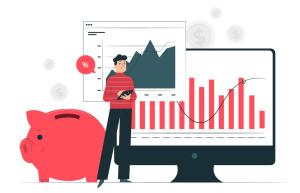Inflation, the rate at which the general price level of goods and services rises, is a critical economic indicator that affects individuals, businesses, and policymakers alike. In recent times, the United Kingdom, like many other nations, has experienced increased inflation rates, raising concerns and impacting various aspects of the economy. In this article, we will delve into the causes of inflation, its consequences, and strategies for coping with its effects in the UK.
Causes of Inflation
- Demand-Pull Inflation: This occurs when demand for goods and services exceeds their supply, leading to price increases. Factors such as increased consumer spending, government stimulus, or global economic growth can drive demand-pull inflation.
- Cost-Push Inflation: Rising production costs, often due to factors like higher wages, energy prices, or supply chain disruptions, can lead to cost-push inflation. When businesses pass these increased costs onto consumers, prices rise.
- Built-In Inflation: This type of inflation occurs when workers demand higher wages to keep up with rising prices, creating a cycle of wage-price inflation. It can be fueled by inflationary expectations and is often linked to labor market dynamics.
- Monetary Policy: Central banks can influence inflation through their monetary policy decisions, such as adjusting interest rates. Lower interest rates encourage borrowing and spending, potentially increasing inflation.
Consequences of Inflation
- Reduced Purchasing Power: As prices rise, the purchasing power of consumers erodes. People may find it more challenging to afford goods and services, impacting their standard of living.
- Uncertainty: High inflation rates can lead to economic uncertainty, making it challenging for businesses to plan for the future. Investors may also be hesitant to allocate resources in an uncertain economic environment.
- Interest Rates: Central banks may raise interest rates to combat inflation, which can affect borrowing costs and investment decisions. Higher interest rates can lead to reduced consumer spending and business investment.
- Income Redistribution: Inflation can impact income distribution, with those on fixed incomes or with lower wage increases feeling its effects more acutely. This can exacerbate income inequality.
Coping Strategies for Individuals and Businesses
- Budgeting: Individuals and businesses can adapt to inflation by creating and adhering to budgets. Prioritize essential expenses, identify areas where costs can be reduced, and allocate resources accordingly.
- Investments: Diversify investment portfolios to include assets that historically perform well during inflationary periods, such as real estate, commodities, or inflation-protected securities.
- Hedging Strategies: Businesses can implement hedging strategies to mitigate the impact of rising input costs, such as purchasing raw materials in advance or entering into fixed-price contracts.
- Negotiations: Negotiate contracts and agreements with suppliers, employees, and clients to account for inflation-related price increases.
- Financial Planning: Individuals can consider financial planning strategies that include investments with potential for growth that outpaces inflation. Consulting with financial advisors can be beneficial.
- Government Policies: Advocating for policies that address the root causes of inflation, such as supply chain improvements or measures to enhance labor market efficiency, can be a long-term solution.
Conclusion
Inflation in the UK, driven by various factors, has consequences that impact individuals and businesses in multiple ways. Understanding the causes of inflation, its consequences, and coping strategies is essential for navigating an inflationary environment effectively. By adapting budgeting, investment, and negotiation strategies, as well as advocating for sound economic policies, individuals and businesses can better manage the challenges posed by inflation while seeking to protect their financial well-being and economic stability.






